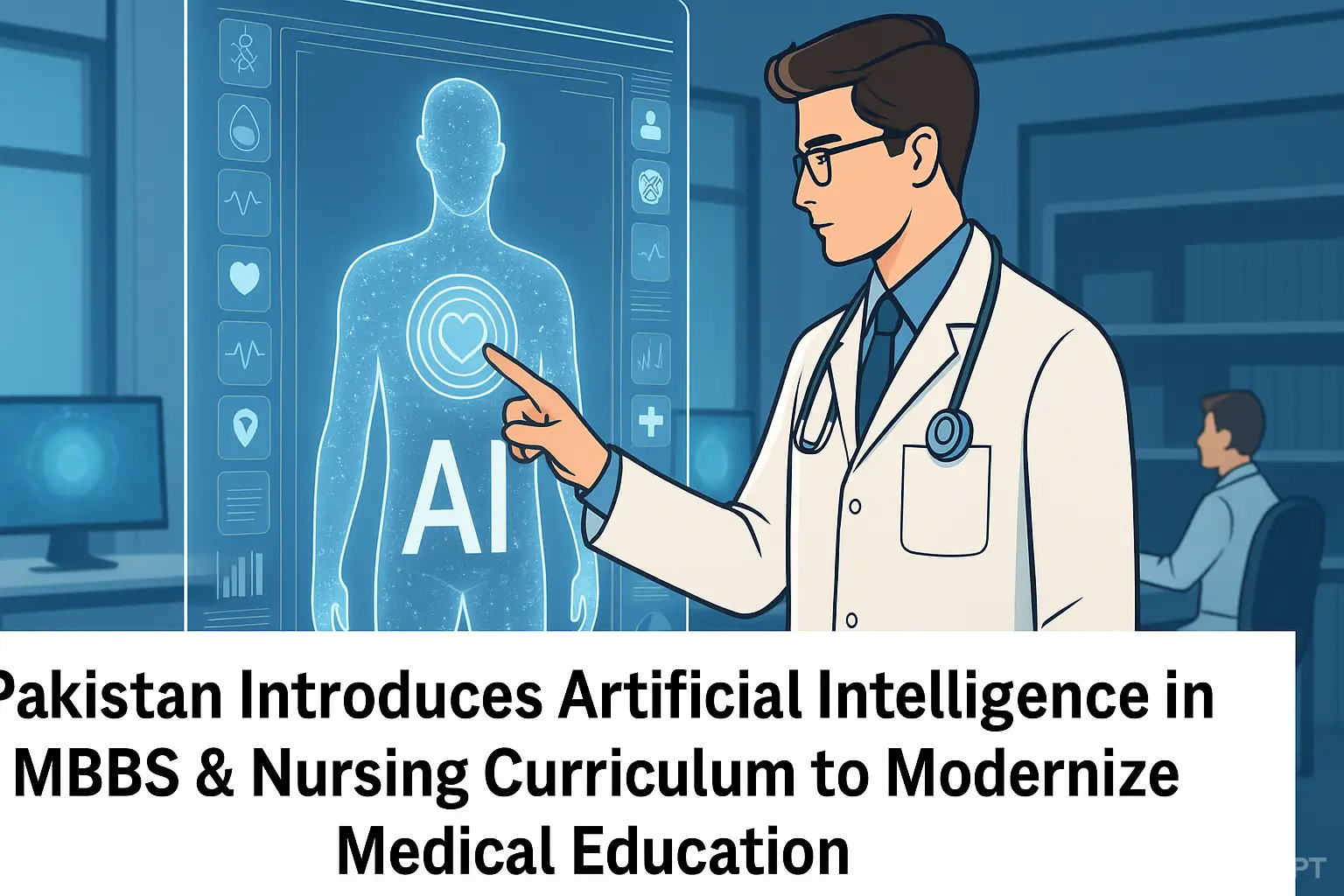Artificial Intelligence (AI) in Medical Education
In a major step towards modernizing Artificial Intelligence (AI) in Medical Education, it has officially been added to the MBBS and Nursing curricula in Pakistan. This forward-looking move aims to prepare future doctors and nurses for the growing role of AI in healthcare, ensuring they are equipped with both ethical knowledge and practical skills in digital medicine.
Artificial Intelligence in Medical Education: A Five-Year Course Introduced
According to a report by Express News, a structured five-year AI course has been introduced into medical and nursing programs. The course will be an integral part of the MBBS curriculum and will also be included in nursing education.
This curriculum focuses on:
- The ethical use of AI in healthcare.
- The practical application of AI tools in diagnosis, treatment, and patient care.
- Helping students understand and adapt to rapid technological advancements in medicine.
AI in Medical Practice: A Game-Changer for Healthcare Professionals
AI is already transforming the way healthcare works globally and Pakistan is joining the wave. With the help of AI:
- Doctors and paramedics will be able to diagnose diseases faster and more accurately.
- AI tools are being used in surgeries, diagnostics, and even in routine patient monitoring.
In Pakistan, pilot projects like the HAMI program and AI-based retinal image interpretation are underway in the Family Medicine Department. These initiatives show how AI can help in the early detection of diseases and improve patient outcomes.
How to Safely Verify BISP 8171 Payment Status Online with CNIC in 2025
Workshops and Teleconsultations: Hands-On Learning for Students
To make this AI integration more meaningful, students are also being given opportunities to:
- Attend data analytics workshops.
- Participate in teleconsultation sessions to better understand digital patient care.
These real-world experiences aim to bridge the gap between traditional medical education and the digital health ecosystem.
AI and Robotic Surgery: Expanding Possibilities in Complex Operations
AI isn’t just limited to diagnosis it’s making major waves in robotic surgeries too. In Pakistan, AI-assisted robotic systems have been introduced for complex procedures such as:
- Abdominal surgeries
- Pelvic surgeries
- Prostate and rectal operations
- Hepatobiliary (liver and bile duct) surgeries
These robotic systems enhance surgical precision, reduce recovery times, and improve patient safety.
Professor Karim Damji: AI Integration Will Be Phase-Wise and Ethical
Professor Karim Damji, Dean of the Medical College at Aga Khan University, shared insights about this development in an interview with Express News. He confirmed that the integration of AI into medical and nursing education will happen gradually, through a phased approach.
Islamabad Supermarts Shift to Digital Payments as IFA Tightens Food Standards
He added:
“A comprehensive AI course has been developed for the five-year MBBS program. Our goal is to make students understand the ethical use of artificial intelligence and how to integrate it with modern medical practices.”
Professor Damji also emphasized that the curriculum will be continuously updated to keep up with the latest innovations in healthcare technology. To ensure this, the university’s Quality, Teaching, and Learning Network has created guidelines for ethical AI use in both classroom instruction and examinations.
Regular Curriculum Reviews to Maintain Quality and Relevance
To maintain international standards, the MBBS and Nursing curricula are reviewed internally every two to three years. Additionally, external reviews are conducted every five years to bring in fresh perspectives from experts outside the institution.
- The Associate Dean and the Curriculum Committee approves minor curriculum changes.
- The Academic Council, chaired by the university’s provost, approves major updates or the inclusion of new subjects like AI.
This ensures that any new addition, including AI, is not only relevant but also in line with the highest educational standards.
BISP 8171 Update September 2025: Verify Eligibility & Receive New Rs 13,500 Payment Online
Conclusion: A Big Leap Toward the Future of Healthcare
The inclusion of Artificial Intelligence in medical education is a landmark achievement for Pakistan’s healthcare system. By educating future doctors and nurses about AI, ethical standards, and digital health tools, medical institutions are preparing them for the future of medicine.
This integration will not only improve patient care but also raise the standards of medical education and professional competence in Pakistan. As technology continues to evolve, initiatives like this ensure that healthcare professionals stay ahead and deliver the best outcomes for their patients.

